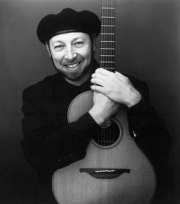|
Биография Richard Thompson
After earning a reputation as a fine guitarist in school bands like Emil and the Detectives, Richard had his first brush with ‘fame’ as a teenaged founding member of the 1960’s folk-rock pioneers, Fairport Convention. Playing an inventive musical mix of blues and California-style rock, the group was quickly dubbed “the new Jefferson Airplane”. The band’s founding members (Iain Matthews, Judy Dyble, Richard Thompson, Simon Nicol, Ashley Hutchings, Martin Lamble) were discovered playing in London’s Soho district, by American producer Joe Boyd. Boyd secured them a recording contract and their eponymous debut album was released in 1968. Shortly thereafter, the band’s lead vocalist, Judy Dyble, was replaced with the ethereal songstress, Sandy Denny.
Other personnel changes followed and over the next four years, Fairport Convention gradually developed a more personal and British based repertoire. 1969’s Liege and Lief, long regarded as a milestone recording in defining British Rock, revealed the extent of Richard’s talent as a songwriter. Here he penned contemporary songs that drew upon deep traditional genres, a writing style that would follow him throughout his career. Other 1969 releases included What We Did on Our Holidays, and Unhalfbricking.
Richard’s last album with the group was Full House, released in 1970.
That year the band also made its American debut, touring with Traffic and Crosby, Stills, Nash and Young. Richard subsequently left the group in 1971. The next year was extremely significant for Richard. The release of his first solo album Henry the Human Fly, regarded by many as a classic and “must have” by his loyal fan base, is reported to have the dubious distinction of Warner Brothers\' worst selling album of all time. Still, it yielded songs like Poor Ditching Boy, The Angels Have Taken My Racehorse Away, and some well-developed instrumentals, which helped establish him as a talent in his own right. This venture brought the once reticent singer in Fairport Convention to the forefront, displaying his vocal abilities and typically twisted humor (Nobody’s Wedding).
In the same year Richard married folk singer Linda Peters.
The combination of Linda’s throaty vocals and Richard’s talents as songwriter and guitarist subsequently led to the recording of six albums by the duo. The release of 1974’s I Want to See the Bright Lights Tonight met with universal critical acclaim, and it’s title track provided Richard with a hit single in the UK.
In 1975, fans saw the release of two albums by the duo, Hokey Pokey and Pour Down Like Silver, containing such classic Thompson material as Never Again and Night Comes In, both still demanded in concert to this day.
After a respite from the music industry, the couple returned to the stage in 1978 and soon released First Light and Sunnyvista, the former including Don’t Let a Thief Steal Into Your Heart, which was later covered by The Pointer Sisters.
|





